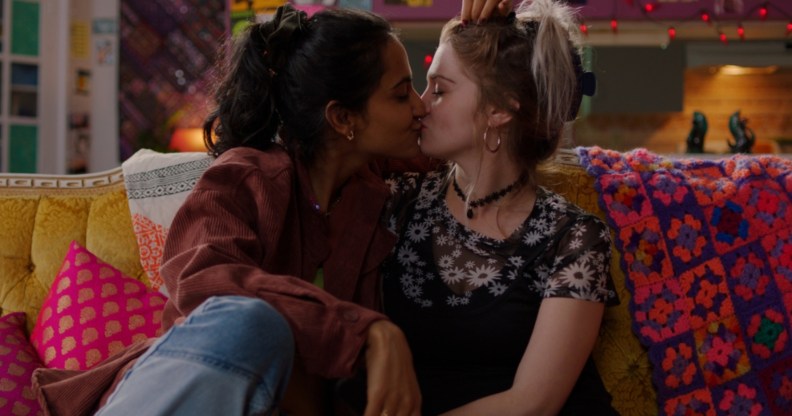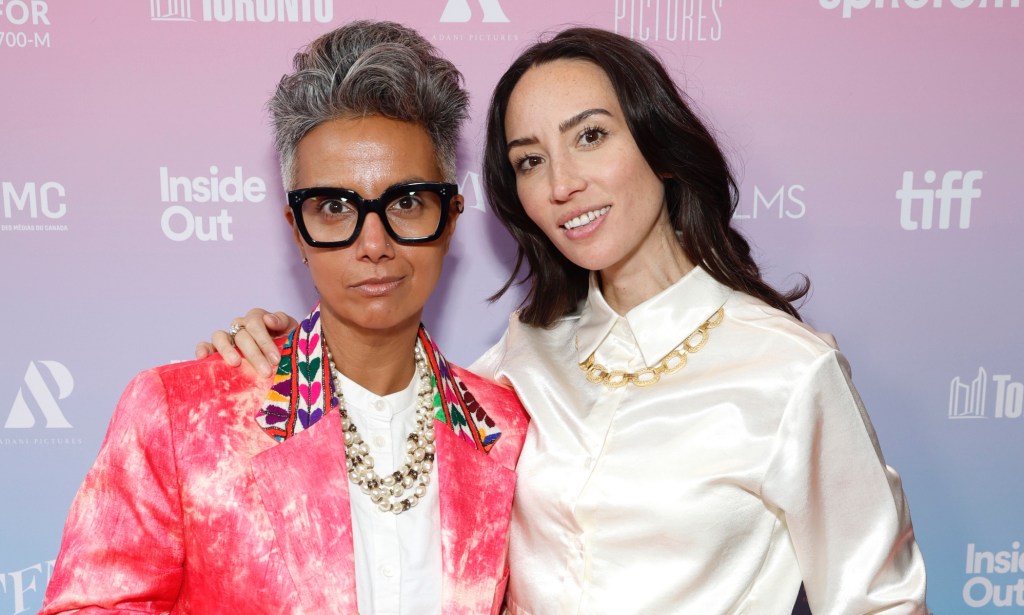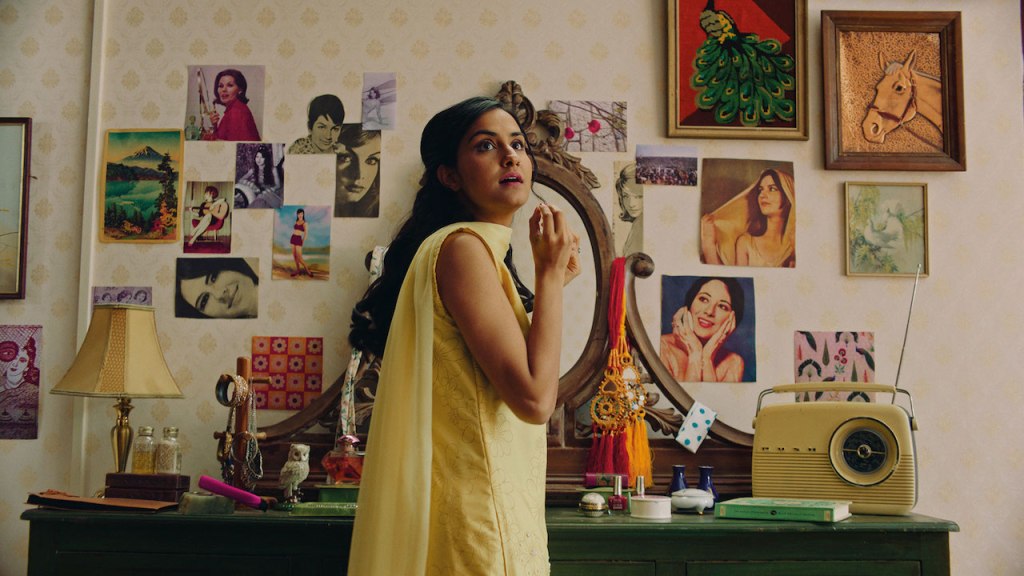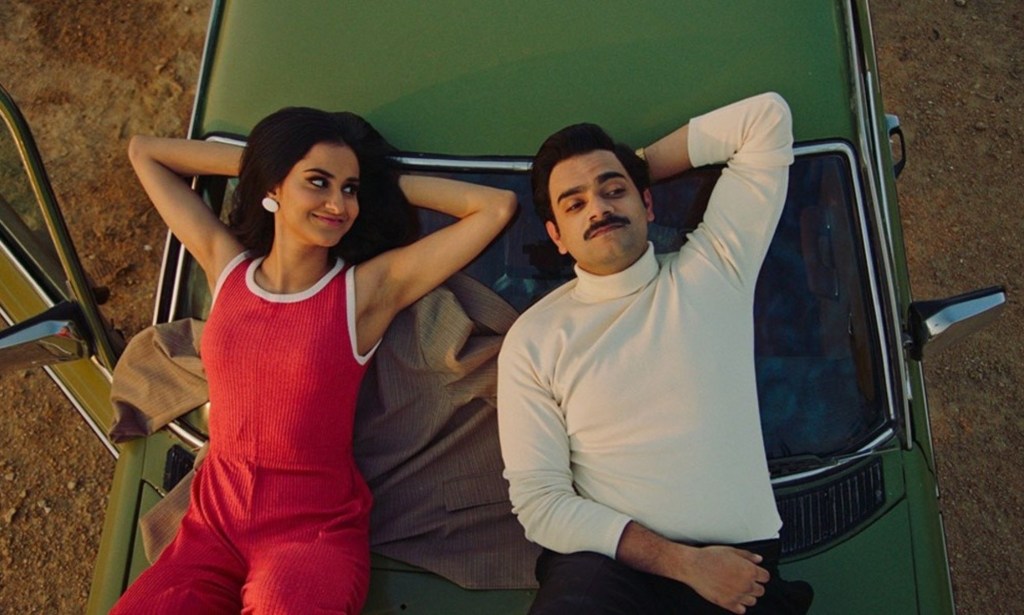The Queen of My Dreams director Fawzia Mirza on providing ‘hope and joy’ for queer Muslims

Amrit Kaur as Azra in The Queen of My Dreams. (LevelK)
Fawzia Mirza explores vibrant 1960s Pakistan, Bollywood fantasy and the fragile bond between a queer daughter and her mother in The Queen of My Dreams – her debut directorial feature.
College student Azra, played by Sex Lives of College Girls star Amrit Kaur, is all too familiar with leading a double life. Away from the prying eyes of her strict and religious mother, she is pursuing a happy relationship with a woman and studying a subject she loves.
But when Azra’s father Hassan (Hamza Haq) dies during a routine trip to visit family in Pakistan, she is forced to return to Karachi for the funeral. Here she must confront the achingly distant relationship she has with her mother Mariam (Nimra Bucha).
In flashbacks, viewers learn of Mariam’s own wild youth in 1960s Karachi, where she defied her parents’ wishes so she could marry the love of her life, Hassan. But when their new family moves to Canada, Azra’s childhood takes a difficult turn as Mariam’s outlook on life grows progressively more conservative.
Tying the three timelines together is both mother and daughter’s enduring love for Bollywood heroine Sharmila Tagore, as the pair realise that perhaps they have more in common than at first imagined.
Here, Mirza tells PinkNews about the decade-long road to her touching ode to Pakistani women in a film infused with the uproarious colours of old-school Bollywood, and punctuated with poignant moments of intergenerational healing.
What was the inspiration behind the film?
The seed is a short film also called The Queen of my Dreams [released in 2012]. [It started] as more of an experimental art project with plans for a gallery show with the footage that I shot. Then, a friend of mine helped me turn it into a three-minute short film.
The reason I made it was because I was really struggling to reconcile my identities. Could I be queer and still be Muslim and love Bollywood fantasy and romance and all these stories I grew up with? Could I still be part of that community? Making this was healing and saved my life.
Seeing people’s reaction [to my work] made me realise that maybe I need to keep making more art, and maybe it can be healing for others. So [I turned it into] a one-person play that was very personal and I performed it in several cities around the world, including Karachi, Islamabad and Lahore.

That show changed my life and it was only at that point that I began to think there could be something more in this. Three years ago, I decided to direct this movie. It’s definitely been a journey and it’s wild to be met with the love that was poured into the making of it.
The film is divided into a few different timelines, including one in 1960s Karachi. Why did you want to explore this part of history?
I was focused on including the portion of the film set in 1969 Karachi, which coincides with the release of Sharmila Tagore’s film Aradhana featuring the song, “Mere Sapno Ki Rani” [which translates to “Rani of my Dreams”. A rani is a queen or princess]. That film, that song, Sharmila Tagore, all these iconic moments in South Asian pop culture were touchstones for my mother and an era that I was really interested in.
How much was your mum involved in the process?
I am definitely inspired by my mother, her generation, and my own experiences. We didn’t have conversations necessarily for the purposes of the film but I’ve heard [of] stories in newspapers and magazines from that time that I was inspired by [such as the hilarious nod to Paul McCartney’s real-life riotous visit to Karachi airport in 1964].

There’s so much that is fantasy in this film. The characters – while inspired by personal experience – are products of a collective memory and collective history.
My mum and aunt grew up in Pakistan in the late 60s and 70s and it was amazing seeing such hyper-specific representation of that experience, such as the obsession with flight attendants from that era.
Yeah, it makes you think: ‘Do they know my life?’ It’s specific, which makes it universal. In that time, the romanticising of the flight attendant was pivotal in our global history of aviation. Suddenly, we had access to the world. There’s something about the 60s as a transitional time that we just can’t let go, nor should we.
How did you approach casting Amrit Kaur and Nimra Bucha, who have to portray this fraught mother-daughter relationship?
The first person we cast in the film was Hamza Haq, who plays Hassan. I wanted a guy who could morph ages and [served as] an anchor point because he is in both these eras, acting with both women.
For Azra, we wanted to cast somebody Canadian and we got some incredible people to read for the role but Amrit just had this spark. Especially through a Zoom camera, when someone can just be in the present moment, it’s kind of magic. She’s an immersive actor who was ready to make this her first indie feature film and bring her everything to this film.
And then with Nimra, it was an immediate connection. I just knew based on what Nimra brought, and what Amrit brought, that they would bring that great chemistry together. I feel fortunate that my gut was right.
Amid the challenges, there is also a message of hope throughout the film, especially around the relationship between queer children and their parents.
[It’s] my mission to make work that has hope and joy in it. Centring that is really important. Obviously, there’s still conflict, but, in order to dream that love and reconciliation [are] possible, we have to see [them] represented.

If you’re not seeing it in your own life, maybe you can see it on the screen, so that was always important to me. The ending is a beginning and I thought about tying loose ends up and telling some sort of a fairytale but [in the end] it’s about believing in the possibility and, in some ways, maybe it’s a bit of a fantasy as well.
What has it meant to hear feedback from queer Pakistani Muslims about what this film means to them?
Just being told that folks feel seen, that in and of itself is why I started writing, because I didn’t see myself. So, I’ve kept going even though it’s been a challenge to be in the industry and start a new career from scratch. I did it so that I could feel seen.
It feels as if there is a shift happening when it comes to telling queer Pakistani stories, earlier this year Joyland was met with critical acclaim. What do you think the future of queer Muslim representation is in the film industry?
I’ve been centring queer Muslim characters since I started writing and acting, then directing, and the fact that now we’re in this moment feels really good, exciting and hopeful. I hope it’s just the beginning.
How did this story make you feel?

